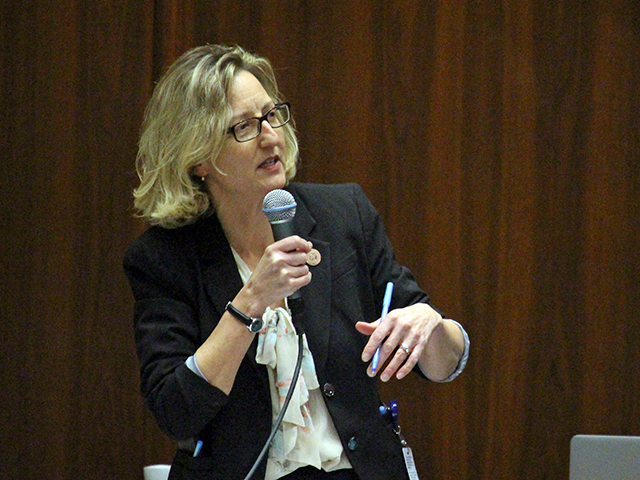Former Democrat state Sen. Kirsten Engel, running for Arizona’s open Sixth Congressional District, appears to have a long history of supporting radical California energy policies, some of which raised the price of gas.
Engel, who wants to represent a portion of Arizona in the House of Representatives, has continuously touted radical California energy policies, such as cap-and-trade, over the years in papers she has written:
- In 2006, she published a paper calling California “a leader on climate change mitigation.” She touted the state’s radical cap-and-trade program, California’s strategy to reduce greenhouse gas emissions. The cap-and-trade program was established by Golden State’s AB 32 legislation and could raise gas prices by 73 cents per gallon and raise the cost of electricity. In fact, Engel specifically cited AB 32 on the first page.
- In 2007, in another paper, Engel noted that “local governments, not the federal government… have taken the lead on climate change policy initiatives,” citing California for “leading the way” on climate change initiatives by enacting a cap upon the state’s carbon emissions. Engel also cited AB32 again.
- In 2011, in another paper published by Engel, she touted California’s gas cap-and-trade program. In the article, she criticized Congress for not being able to enact climate legislation, making states seek their own approval to “meet climate change-related standards through programs that the states themselves have pioneered,” such as cap-and-trade.
According to the California Legislative Analyst’s Office, cap-and-trade could raise gas prices by 63 cents per gallon in 2021, increasing to 73 cents per gallon in 2031. Additionally, the Sacramento Bee reported that California’s cap-and-trade program has resulted in increased gasoline prices, increased costs for businesses by requiring them to spend money on carbon allowances and leading to an increase in electric bills.
Additionally, Engel touted the Golden State in 2015 for being at the “forefront of the development of a low carbon fuel standard,” which created a carbon fuel standard that added an estimated 22 cents per gallon to the price of gasoline.
In 2015, she touted the carbon fuel standard when she wrote that California has “been at the forefront of the development of a low carbon fuel standard” and is “responsible” for having the “first known low-carbon fuel standard mandate” and noted in the paper that the California Air Resources Board developed criteria for a low-carbon fuel. She wrote:
California has been at the forefront of the development of a low carbon fuel standard and indeed, is responsible for enacting, in 2007, the first known low-carbon fuel standard mandate. The California Air Resources Board subsequently developed criteria for the standard that took effect in 2011. Nevertheless, the timing of similar proposals by other governments demonstrates that California was not alone in developing a low- carbon fuel standard at this time [emphasis added].
The Wall Street Journal, in March of this year, detailed “why Californians are paying $6 per gallon for gasoline while Texans pay less than $4.” One of the reasons the Journal noted was the higher taxes the states have in addition to the “state’s specialized reformulated gasoline blend.” It also said that the California Air Resources Board, in 2015, instituted a “low-carbon fuel standard” that requires refiners to reduce the carbon emissions from the gasoline they blend. The 2015 carbon fuel standard adds an estimated 22 cents per gallon to the price.
Furthermore, Engel said in 2006 that a state could “rationally structure a carbon taxing scheme” by enacting a “consumption tax upon all goods,” which can be “easily calculated” and would be a tax levied on consumers for the pollution released in producing the goods purchased by the consumers. In her 2006 paper, she wrote:
Such a tax is easily calculated. Second, a tax can be levied on consumers on the basis of the pollution released in producing the goods purchased (consumption tax) [emphasis added].
…
In sum, a state might rationally structure a carbon taxing scheme by either enacting a consumption tax upon all goods, whether produced in-state or imported, or as a combination of an emissions tax applicable to goods produced and sold in-state and a consumption tax applicable solely to imported goods. Under the latter, hybrid approach, goods produced in-state, but exported out-of-state, would not be taxed in-state and in-state industries would receive a rebate for emissions attributable to the production of goods exported [emphasis added].
Dan Walters explained in his commentary at CalMatters, “California has seen decreasing refining capacity due to the state’s commitment to eliminating gasoline-powered cars and trucks and shifting to “zero emission” vehicles powered by batteries or hydrogen.”
“Refiners are unwilling to invest in production upgrades when their operations face state-mandated phaseout, and as in-state refining declines, California is no longer a self-contained fuels island,” Walters added.
Evidently, Engel’s past comments come to light as President Joe Biden dismissed the high California gas prices when he spoke to reporters during a recent visit to Los Angeles. When he was asked to react about the price of a gallon of gas, which is nearly seven dollars, he replied, “Well, that’s always been the case here.”
Jacob Bliss is a reporter for Breitbart News. Write to him at jbliss@breitbart.com or follow him on Twitter @JacobMBliss.

COMMENTS
Please let us know if you're having issues with commenting.